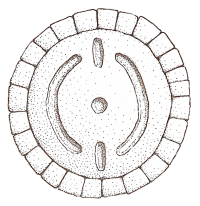Downtime
Damage and Healing
Recovering From Normal Damage
Most damage a character takes is temporary; it represents fatigue, morale, and the momentum of the fight. Normally, damage can be healed by taking a few minutes to breathe and rest.
When you have a chance to rest, you can roll some or all of your recovery dice. You have a number of recovery dice based on your level, and the type of die is determined by your class (see classes). You add your constitution modifier, and each die you roll reduces the damage you have accumulated. Once you use a recovery die, it is spent for the day.
For example, Belidun the Rogue has 21 hp, and took 9 points of damage from a hard landing while escaping a gang of orcs. Once he's in the clear, Belidun has a chance to rest. He has 3d8 for recovery dice, because he is a third level rogue. Belidun uses one of his dice, and rolls 6 on his 1d8, then adds +1 from his Con bonus. He reduces his accumulated damage to two, and decides to save his remaining two dice for later.
When accumulated damage drops below half your HP, you are no longer bloodied (unless some other effect, such as poison, causes you to count as bloodied).
A full night's rest restores all your recovery dice; an interrupted rest restores half.
Healing Wounds
A character is only significantly wounded when their damage exceeds three quarters of their HP. This damage is recorded as wound points, which are much more difficult to heal than normal damage. Whenever you take damage past your wounded threshold, record where you were hit, and for how many points. It is possible to have multiple wounds of differing severity.
Wound points can’t be healed with recoveries—they count as points of damage until the wound is healed. As long as a character has at least one wound point, they are wounded.
To check for wound healing, roll one DC 10 Constitution check for each wound at the end of each full week since receiving the wound. With full rest, you can roll twice per wound per week. A success reduces a wound by one point; a wound reduced to 0 points is fully healed. Someone with the heal skill can help a recovering character by tending to their wounds.
Nasty Wounds
Some wounds are especially debilitating and difficult to heal. Any wound caused by a critical hit or by critical failure on a saving throw is a nasty wound. A wound which becomes infected also becomes a nasty wound. The DC to heal a nasty wound is 15 instead of 10.
In addition to the wounded condition, nasty wounds apply a further penalty, appropriate to their location—normally a -2 on some appropriate rolls. Examples: -2 on checks to hear for a wound across the ear, -2 on acrobatics for a leg wound, -2 on checks with an injured hand, -3 hp for a chest wound.
If a nasty wound is not fully healed in a number of weeks equal to the wound points, it has healed poorly. You permanently lose 1 hp, and the associated drawback becomes permanent. Any remaining wound points are healed normally (with a DC of 10).
Downtime Actions
In stronghold play, each year is divided up into Seasons. A season lasts 3 months--plenty of time for a mission or two and a variety of activities. Characters travel, carouse, oversee their affairs, and so on. Focusing on one area does have its benefits, however.
Each season, a character can gain one of the following benefits, if it is the sole focus of their activity and they do not undertake any real missions.
Crafting/Researching: A character who focuses on a completing a single project gains a +4 bonus on any necessary rolls. This single-minded focus is practically a prerequisite for the most difficult projects--sometimes, total focus is just what it takes to crack a problem.
Resting: A character who spends their time relaxing, without subjecting themselves to stress or responsibility, gains one extra recovery die at the start of their first mission next season.
Training: A character who spends their time training and practicing can start to pick up a new language, gain proficiency in a weapon or armor, or gain a +2 bonus on attacks against a specific type of enemy. Other benefits, like mastering a specific Feat (Skill Focus is a popular choice), are also possible. Whatever a character trains for, the benefit only lasts through the next season (except for learning a new language).

1 Comment
ability damage is currently excluded; should probably work like wound healing, but should often be faster.